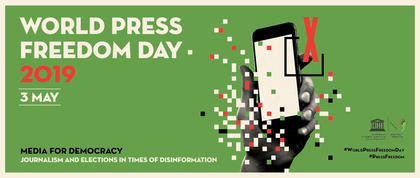
Dear Colleagues and Students:
Today marks World Press Freedom Day, designated by the UN General Assembly in 1993. Now an annual observance, the date is marked in over 100 nations worldwide and under the auspices of UNESCO, its mandate is freedom of the press and freedom of expression, in the belief that these freedoms allow for mutual understanding to build a sustainable peace.
The importance of this day is also closely aligned with Sustainable Development Goal 16, which promotes public access to information. Likewise, the Universal Declaration of Human Rights refers to the right to receive information (Article 19). These ideals shine a much-needed light on how a free press can ensure and enhance wellbeing worldwide.
But there’s work to be done. One timely example of how misinformation online and off can harm public health is the current resurgence of measles in the U.S., with over 700 cases now reported. We’ve witnessed how the anti-vaxxer movement deceives well-intentioned parents who fall prey to misinformation. In fact, among WHO’s ten threats to global health this year is “vaccine hesitancy” -- the reluctance or refusal to vaccinate.
And there are more sinister forces at work. A study in the American Journal of Public Health concluded that Twitter bots and Russian trolls weaponized health communication by spreading anti-vaccine messages and eroding public consensus on vaccination.
But there’s hope: a recent opinion piece in the New York Times advocates a novel approach, saying that disinformation and fake news should be treated as a public health crisis. Education – “increasing the immunity of citizens” to distortions or outright fictions -- is the first and most critical step for a solution. In this way, public-interest journalism is critical to public health.
To combat public health misinformation, the role of a free press is critical. “Journalism can … be a beacon in a storm of information where unchecked lies are disseminated and emotions are whipped up to the detriment of a culture of peaceful conflict resolution.” (UNESCO)
Please join me on World Press Freedom Day in thanking journalists for the vital roles they play in improving public health. Their reporting can both inform populations and save lives, even as they often put their own at serious risk.

Julia Cartwright, MA
Senior Associate Dean of Communications, Promotion and Public Affairs
Chief of Staff